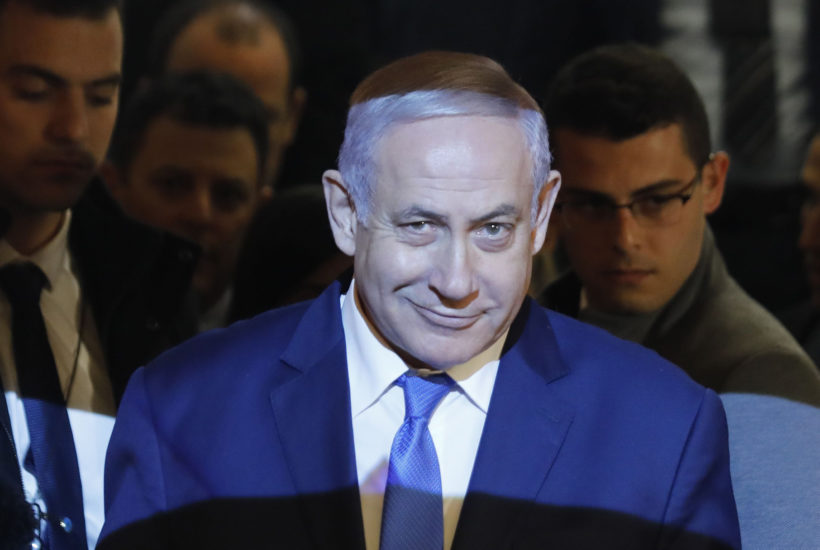There are little in the way of festivities but today is nonetheless a landmark in Israeli history: Benjamin Netanyahu becomes the country’s longest-serving prime minister, displacing beloved founding leader David Ben-Gurion. Netanyahu has been in charge for 4,876 days, governing for a three-year term in the late 1990s then continuously since 2009. His Israel would be unrecognisable to Ben-Gurion.
Where the Old Man presided over an agrarian society surrounded by almighty Arab armies sworn to its destruction, the land of Bibi is the ‘Start-Up Nation’, an economy powered by technology and pharmaceuticals and undergoing a diplomatic spring with the Arab world. Israelis are happy, healthy and prosperous, and deadly terror attacks are at their lowest since 2013.
But all things — good or bad — must come to an end and with fresh elections looming in September and prosecutors circling with corruption indictments, the Netanyahu era looks to be in its twilight days. Of course, Bibi has been written off many times before and bounced back (usually with a dirty trick) but talk is turning all the same to his legacy. His most cogent Israeli critic, the Haaretz journalist Anshel Pfeffer muses:
‘His legacy is his longevity, and precious little else… He has been an effective steward of Israel’s economic fortunes, its security and foreign relations, but he has been reaping what his predecessors sowed and laid very few foundations of his own.’
There is a lot in this and Pfeffer expands on this critique in his definitive biography of Israel’s ninth prime minister. Many of Israel’s current successes fell into Netanyahu’s lap, the bounties of others’ efforts, but this cuts both ways. That Bibi has been a largely inert PM complicates the left’s contention that he has remade Israel in his image as a chauvinist redoubt, at ease with nativist strongmen, contemptuous of international institutions and apathetic about peace. If Israel has transformed, someone had to do the transforming, and it wasn’t Netanyahu. This is the other bounty he inherited: a decade of the Israeli centre, the international community and the Palestinians laying the groundwork for his return to power.
The seeds of Bibi’s Israel were sown in the 2000s, the lowest ebb in Netanyahu’s political career. He had been booted from power by Labor’s Ehud Barak in 1999 and, though serving two-and-a-half years as Ariel Sharon’s finance minister, he resigned over the Gaza disengagement and subsequently led Likud to its worst ever election result. However, this decade was more fortuitous for Bibi than it appeared. Yasser Arafat walked away from statehood at Camp David and the bloody Second Intifada soon followed. Sharon withdrew from Gaza amid dreamy talk that finally the world would see Israel as the peace-maker and the Palestinians as the aggressor. Instead, the disengagement brought thousands of Hamas rockets and accusations of war crimes when the IDF tried to stop them. Israelis sold on a vision of ‘land for peace’ watched as land was exchanged for Qassams, boycotts and the Goldstone Report.
Netanyahu may have capitalised on the cynicism that built up in the 2000s. He has certainly done nothing to rekindle the optimism fostered by Yitzhak Rabin and the prophets of Oslo. But he did not create the circumstances which have contributed so generously to his political fortunes. Bibi’s opponents enabled his resurrection and in their listless, divided state they have done more to consolidate his grip on power than their bêtes noires Sheldon Adelson and Israel Hayom.
Understand the legacy of Netanyahu’s enemies and the possibilities of the post-Bibi era come into sharper focus. The Oslo generation he inherited were soured from seeing every Israeli push for peace rebuffed, often violently; the Bibi generation will come to political maturity with no such memories and might well look back resentfully on a wasted decade. What Netanyahu has achieved — US recognition of Jerusalem and the Golan Heights — could lull Israelis back into the dream of two states and international legitimacy. Bibi’s embrace of unsavoury characters like Viktor Orban and Jair Bolsonaro has been dispiriting for Israeli liberals but this too supplies an opportunity: if Bibi’s Israel could talk to regimes with dubious records on anti-Semitism, what is to stop post-Bibi Israel from sitting down once again with even the more extreme Palestinian leaders?
Netanyahu turned his opponents’ failures to his advantage. There is no reason his successors cannot do the same. After 13 years in power, Netanyahu has not fundamentally changed Israel but he may yet hand his rivals the chance to do so.







Comments